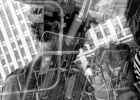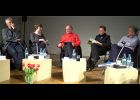El extraño señor llamado Vilém F.
This essay is a reflection from various perspectives on the life and work of Vilém Flusser. Structured as a series of scenes, it connects biographical and geographical reflections, ranging from his escape from Prague, his residence in Brazil, and his return to the city of his birth, with considerations on the peculiar structure and reception of his work, marked by its thematic and disciplinary heterogeneity. Through these scenes, the figure of a nomadic thinker, “groundless” (bodenlos) emerges, one who evades closed systems, inherited traditions of thought, and stable foundations. His life and work are permeated by displacement, discomfort, and constant challenge. Each section emphasizes a different aspect: his relationship with art and design, the playful character of his writing, his polyglot practice and its influence on his creative process, and his way of thinking about technology in dialogue with phenomenology, cybernetics, and philosophy. The aim is not to fix Flusser into a single definitive category as writer or philosopher, but to demystify him, placing him as a man of our present, highlighting his condition as a radical contemporary capable of reading our time as a Heraclitean flow, turbulent and labyrinthine.
Desaparelho: do protótipo ao conceito / Disapparatus: From Prototype to Concept
This phenomenological essay, based on Flusser’s philosophy, is about a photographic prototype created by the author called Disapparatus which problematizes the very gesture of photography. Technically, the Disapparatus is an optical gadget that, when coupled with a photographic apparatus, produces an overlay of three distinct images. Although initially the interaction with the Disapparatus is similar to that with a normal camera, a more serious engagement reveals a program that does not operate according to traditional photography, such as the hunting for viewpoints. The new game questions the traditional meaning of representation, object, space, and the self. And in this respect, it resembles, to a certain degree, to the classical phenomenological game itself.
Poetisches Ent-werfen. Vilém Flussers Bildungsbegriff?
This paper examines Vilém Flusser´s work for its an educational view. The untranslatable German term Bildung will be the point of reference for this paper. Following this approach, the question is how humanity can be humanity, how humanity can conserve or transform the idea of humanity in a culture of digitality. In the first chapter, the terms “critique” and “doubt” are discussed since these serve as a basis for Bildung. In the context of Flusser's thought, critique and doubt even serve as the basis of human beings in general. The ability to criticize one´s society is what constitutes a human. The second chapter then introduces Flusser's ideas of project, a matter of “ent‑werfen” – loosely, “pro-jecting” oneself into society. Flusser is following Heidegger's idea of “ent‑werfen,” which is in turn related to the idea of poesis. Poesis as a project will then be discussed as a means human beings have of changing their society. Poesis means to create the world. The conclusion focuses on the German idea of Bildung with a reference to Flusser. It shows the outstanding relevance of his thinking as well as the special relevance of Flussers works for the concept of Bildung.
Flusser’s Plantonic Philosophy
This essay examines the imagery of trees in Flusser’s works such as Natural:Mind, as well as shorter essays “On the Forest” [Da Floresta] and “Plant Film.” The figure of trees and plants cut across the different facets of Flusser’s corpus: from his employment of Husserlian phenomenology, to his retooling of Heidegger’s metaphysics, to his views on media thinking and the apparatus. Understanding his engagement with the plant world can help us understand his modernist method of thinking and the importance of language as a mediating apparatus for thinking. Together, these ideas about trees offer a unique view into Flusser’s thinking of media as a locus of innovation and resistance – two modernist concerns par excellence.
Vilém Flusser et la recherche-création
This paper highlights some of the parallels and resonance effects that can be observed between the way Flusser advocated dealing with the “art crisis” and the way some institutions conceive and justify their “research-creation” programs today. Seen in this way, Flusser appears to have already been calling for a way of enhancing both research and creativity a half a century ago. We have yet to understand the epistemic, aesthetic and political implications of the specific method of interrogation he proposed (the Pilpul).
Flusser, La Force du Quotidien, Mame, 1973. Histoire d’une édition et d’une occasion manquée
This essay tells the story of Vilém Flusser’s first French publication, La Force du Quotidien, published in 1973 by the editor Mame. It is a collection of short phenomenological essays examining everyday objects such as mirrors, books, cars and beds.
Vilém Flusser et Abraham Moles: le fond et la forme d’une « affinité combative »
The central role that Abraham Moles played in Vilém Flusser's thought during the first years after his return to Europe in 1972 is indisputable. Certain personal coincidences are striking: they were born in the same year 1920, and they died six months apart (respectively in November 1991 and in May 1992). From a theoretical point of view, the affinities between the two friends are also remarkable: if the interest in the phenomenon of cybernetics connected them, it is the aesthetics of communication open to phenomenology that allowed them a fruitful exchange.
But there is a third element, more formal and less known: their paradoxical Jewishness. The reference to the Golem myth, which appears as the background of their cybernetic thoughts, seems to refer to the Judaic substratum that animated their method of study involving heated discussions.
Thus, after some biographical data, these three elements provide the general outline of the article: the cybernetic approach, the phenomenological method, and the Talmudic practice. The goal is to show how the relationship between Vilém Flusser and Abraham Moles shows that, beyond intellectual gestures, in which they sought, in a perpetual effort, to regroup (the law of “elective affinities”), real “combative affinities” remain, resisting the entropy of the world and eternal oblivion.
Gestural translations from within the (post)digital: a Flusserian analysis of phonic gestures
Bridging the gap between Vilém Flusser’s theorising around language and work on gesture, this paper will examine the collection of gestures that form a constituent ‘vocabulary’ of our mobile phone use. The presented research examines a wide array of gestural taxonomies that take the form of dictionaries and notations which have been used in attempts to define such developing vocabularies. However, the paper is critical of these taxonomies as it argues they reveal a central problematic at the heart of any gestural vocabularies: the reduction of the body into the biomechanical; an assortment of weighted pulleys and levers. As a result of this, these gestural taxonomies are shown to create technical images of the body reducing it further to nothing more than a functionary of an apparatus. In response to these limitations implicit within such taxonomies, the paper reconsiders today’s developing gestural language in terms of the writing of Flusser. It argues that his work allows for gesture to be examined as phenomena, and in viewing these gestures as situated and witnessed phenomena, it becomes possible to perceive of them not simply as symbolic movements of the body, but rather as a form of translation. The paper then argues that what is being translated through these phonic gestures can be understood as a postdigital condition that has emerged following the alleged end of the digital revolution. To evidence these claims, the paper performs a gestural analysis of Luke Collins’s short film, Swiped (2019) that demonstrates an interaction between two individuals attempting to navigate a peculiar (post)digital situation.
Rethinking Interology with Flusser
Motivated as much by a deep concern with the rapidly evolving human condition as by intellectual curiosity, this article reveals the problem-driven and futurological nature of Flusserian interology [Deleuze]. It proposes that compared to traditional ontology, the notion of interality and the dynamics of interology offer us a more adequate way of thinking through our situation in the here and now and in the immediate future. The secondary motive is to turn Flusser’s media philosophy into a pointillist verbal art, a techno-ethics, and an intertopia befitting the digital era.
"Für eine Phänomenologie des Fernsehens" III: Nam June Paik und eine künstlerische Phänomenologie
When Vilém Flusser arrived at the conference held at the Museum of Modern Art in New York in January 1974 he did not know that an artist was responsible both for the conception and the title of the meeting. Flusser aspired to develop his media theory differently and in front of a completely different philosophical background as McLuhan. Nam June Paik, at that time in his zenith, most likely influenced Flusser philosophically as well as in terms of art examples and much more than Flusser was ready to admit in his short reference to one of Paik’s early non-electronic pre-video films. It is a bit strange that Flusser shied away from the confrontation with art in and with television. It is all the more important to determine the theoretical space that Nam June Paik must have opened to Flusser and others. Against this background it becomes clear that Flusser was able to approach the heritage of phenomenology in a more open und artistic, that is, in a more literary and essayistic way.







